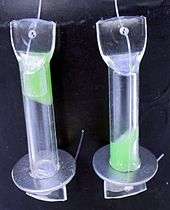Solar Cookers International
Solar Cookers International (SCI) is a U.S.-based non-profit advocacy group in Sacramento, California, founded by a group of people in 1987 and incorporated on January 6, 1988.[4] Solar Cookers International advocates for and provides education on solar cooking.[5]
 | |
| Abbreviation | SCI |
|---|---|
| Founded | 1987 |
| Founders | Joseph Arnaboldi, Barbara Blum, Bev Blum, Georgianna Borgens Wanjiru, Sherry Cole, Anne Funkhouser, Barbara Kerr, Dave Martin, Don Mahlberg, O. Boyd Mathias, Bob Metcalf, John Murphy, Blaine Pack, Margaret Payne Clark, Eleanor Shimmeal, Carmen and Edwin Pejack, Terry Snyder, and Sheri Lewis. |
| 68-0153141[1] | |
| Focus | advocacy and education |
| Headquarters | Sacramento, California, United States[1] |
Area served | worldwide |
| Methods | direct service, partnerships, and global advocacy |
President | Jim Moose[2] |
Executive Director | Caitlyn Hughes[2] |
Revenue (2014) | $486,898[1] |
| Expenses (2014) | $404,801[1] |
| Endowment | $10,000[1] |
Employees (2013) | 7[1] |
Volunteers (2013) | 40[1] |
| Website | www |
| Member of Solar Cookers International Association[3] | |
Recognition
Solar Cookers International won an Ashden Award in 2002 for their work with solar cookers in Kenya. In August 2006, SCI was the winner of the World Renewable Energy Award.[6]
History
Solar Cookers International was founded in 1987 as Solar Box Cookers International. Two American women described as American's serious solar cooker promoters in the 1970s, Barbara Kerr and Sherry Cole partnered with other supporters to form this organization.[7]
SCI produced and distributed manuals describing construction and use of solar box style cookers. They became advocates of how solar cooking could be incorporated into development and relief agency programs. SCI's role evolved into networking with other solar cooking organizations worldwide. They hosted forums for dialog including co-sponsoring three international solar cooking conferences with the University of the Pacific, US, in 1992, the National University of Costa Rica in 1994 and the deemed university, Coimbatore, India in 1997.[8]
SCI also administered a series of solar cooking field projects. Since 1995, SCI has managed or co-managed solar cooking projects in the Nyakach district, Kenya; in the Kakuma refugee camp, Kenya; in the Aisha refugee camp, Ethiopia; in various communities, Zimbabwe; and in Dadaab refugee camp, Kenya.
SCI supported the development of the CooKit, a mass-producible, foldable solar cooker in the 1990s.[9]
Programs and projects

SCI was instrumental in the formation of the Solar Cookers International Network, which is an association of approximately 500 non-governmental organizations and government agencies, manufacturers, and individuals promoting solar cooking throughout the world. The Solar Cookers International Network wiki[10] includes over 1700 articles categorized by country, individual, NGO, manufacturer, and solar cooker designs. Also included is information regarding related technologies such as heat-retention cooking, water pasteurization, solar food processing, solar food drying, solar autoclaving, and solar canning. The Network maintains a wiki-based website] that allows the network members to share information and experiences at http://solarcooking.org.
SCI has hosted regional and international solar cooking conferences, most recently the Solar Cookers International Conference held in Granada Spain in 2006. SCI publishes Solar Cooker Review three times a year.
CooKit
SCI developed the CooKit as an adaptation of a cooker designed by Dr. Roger Bernard in France. The cooker consists of a foil-lined cardboard reflector with a dark pot inside a plastic bag. This simple mechanism converts hundreds of watts of sunlight into heat and can cook one or two pots of food at a time.
SCI has set up local production of this cooker in Nairobi, Kenya and in Sacramento, California. The CooKit is used in many solar cooking projects around the world.
Cardboard, aluminium foil, and plastic bags for well over 10,000 solar cookers have been donated to the Iridimi Refugee Camp and Touloum Refugee Camps in Chad by the combined efforts of the Jewish World Watch, the Dutch foundation KoZon, and SCI. The refugees construct the cookers themselves, using the donated supplies and locally purchased Arabic gum,[11] and use them for midday and evening meals. The goal of this project was to reduce the Darfuri women's need to leave the relative safety of the camp to gather firewood, which exposed them to a high risk of being beaten, raped, kidnapped, or murdered.[12][13][14] It has also significantly reduced the amount of time women spend tending open fires each day, with the results that they are healthier and they have more time to grow vegetables for their families and make handicrafts for export.[11]
See also
References
- "People". Solar Cookers International. Accessed on February 1, 2016.
- "Solar Cookers International Association".
- "Solar Cookers International Archived 2015-03-15 at the Wayback Machine". Business Entity Search. California Secretary of State. Accessed on February 1, 2016.
- http://energy.gov/articles/solar-cookers-bring-hope-earthquake-victims US DOE
- "Renewable Energy Awards 2018". www.reiaward.com.
- "Inventor turns cardboard boxes into eco-friendly oven". CNN International. 2009-04-09. Retrieved 2009-11-29.
- "History". Solar Cookers International. Retrieved 2009-11-30.
- "The Simple Panel Cooker that Feeds Tens of Thousands Daily". Retrieved 25 November 2017.
- "Solar Cooking". solarcooking.org.
- "Solar lifeline saves Darfur women". CNN.com. September 17, 2007. Retrieved 2008-03-06.
- "Sides, Phyllis. Local woman helps keep the spotlight on the crisis in Darfur. Journal Times: Beyond Wisconsin. May 16, 2007, accessed May 29, 2007".
- Jewish World Watch. Solar Cooker Project. 2007, accessed May 29, 2007.
- Tugend, Tom. Jewish World Watch Eyes National Stage. Jewish Journal of Greater Los Angeles. June 16, 2006, accessed May 29, 2007.